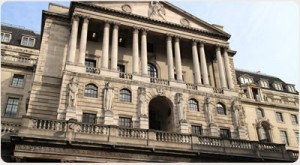The Bank of England has cut interest rates to 0.1% – their lowest level ever – as it attempts to deal with the economic fall-out from the coronavirus pandemic.
The move is the second emergency cut in just over a week prompted by the outbreak – last week the rate was reduced from 0.75% to 0.25% shorlty before the Budget.
Today’s move came as the total number of deaths in the UK rose to 137. 
The Bank also pledged to pump £200bn more into the economy at the unscheduled meeting of its Monetary Policy Committee (MPC).
The Bank of England said the spread of Covid-19 and the measures being taken to contain the virus would result in “an economic shock that could be sharp and large, but should be temporary”.
It added in a statement: “At its special meeting on 19 March, the MPC judged that a further package of measures was warranted to meet its statutory objectives.
“It therefore voted unanimously to increase the Bank of England’s holdings of UK government bonds and sterling non-financial investment-grade corporate bonds by £200bn to a total of £645bn, financed by the issuance of central bank reserves, and to reduce bank rate by 15 basis points to 0.1%.”
James Durie from Business West – the region’s largest business organisation and the body behind Bath Chamber of Commerce and the Bath & North East Somerset Initiative – said the move reflected an “extremely concerning near-term outlook for the UK economy”.
He added: “This may give a short-term boost to market confidence but will have little long-term effect unless it translates to practical support for businesses.
“It is critical that the Bank of England works with financial institutions to ease cashflow challenges for firms on the ground in this increasingly turbulent period.”
CBI chief economist Rain Newton-Smith said the move showed a desire by the Bank to do whatever it takes to protect the economy from the worst of the Covid-19 crisis.
“For many firms the situation is already critical, with dwindling cash flow forcing tough decisions,” she said.
“Companies are doing all they can to help employees through these unprecedented times. And the response from government and the Bank of England so far has been encouraging.
“But the economic impact also requires urgent, swift intervention to protect pay and livelihoods to be delivered within days.”
British Chambers of Commerce (BCC) head of economics Suren Thiru said the decision reflected “an increasingly dire near-term outlook for the UK economy”.
“This may give a short-term boost to market confidence, but will have little long-term effect unless it translates to practical support for businesses,” he added.
“It is critical that the Bank works with financial institutions to ease cashflow challenges for firms on the ground in this increasingly turbulent period.”



















